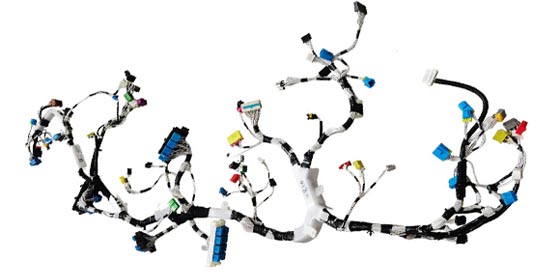- All
- Product Name
- Product Keyword
- Product Model
- Product Summary
- Product Description
- Multi Field Search


Views: 10 Author: Site Editor Publish Time: 2022-08-23 Origin: Site
There are quite a few electronic components inside a car, so there is no shortage of various wiring harnesses used for connections. When we choose a replacement harness for our car, what type should we buy, and what should we do to choose the right one? It may be a problem that many people struggle with. Through this article, Maojia, an automotive wiring harness manufacturer, will share with you what an automotive wiring harness is and how we should choose the right one.
An automotive wiring harness is the collection of wires that connects all the electrical devices and components in your car to the primary power source. Typically, a wiring harness includes a fuse box and - at a minimum - 8 to 12 circuits.
What circuits, you ask? It's nothing more than wires designated for a specific purpose, such as a set of wires for headlights (2 circuits), a wire for dome or glove box lights (1 circuit), a wire for the starter, etc. The number of circuits you need depends on the number of electrical components you have, with specific vehicles (such as off-road vehicles) requiring only a few circuits. The main difference between the 12, 18, and 24 circuit harnesses is compatibility with your vehicle.
In other words, if you have an actual vehicle (for example, an off-road vehicle without any brake lights, overhead lights, etc.), then a simple 12-circuit harness will do the trick. If you are replacing classic car wiring with a lot of luxury, you may need a 24-circuit harness.

Before purchasing an automotive wiring harness, we first need to determine two things.
1. Circuits - how many do you need?
2. Quality - How will you determine if the harness you're buying is well made?
When you break it down, it makes the selection of the exact kit you need very simple. Here's what you need to know.
If a harness is just a bunch of wires with connectors, how do you tell the difference between a quality and an inferior harness? Here are a few key factors that separate quality from poor quality.
Look at how the connectors are connected. The harness manufacturer can connect the wiring to the connector or fuse box in two ways.
Crimping and soldering
Crimp connections don't always include every strand of wire. For example, a crimp connection that captures only half of the wire strands conducts much less power than a crimp connection that captures every wire. Less conduction = more resistance, which means voltage loss. If the voltage is too low, many components will not work or will work but will wear out prematurely.
With crimped and soldered connections, the conductivity of the connection is no longer an issue, even if some strands do not "catch" in the connector. In addition, the combination of crimp and weld is inherently more potent than crimp and is an essential consideration for vehicles used for racing or off-road driving.
In general, welded and crimped connections are the only way to go. This is the standard used by all new vehicle manufacturers.
Determine if the harness is expandable. You need an easily expandable harness, even if you don't intend to expand the number of circuits. Here's why.
For a harness to be considered "expandable," it must be built to hold more amps than the number of circuits it contains.
The best way to ensure that the harness can accommodate more amperage is to use heavier gauge wiring than needed.
So-called "oversized" wiring is usually good because it ensures that each circuit has minimal voltage drop and the harness will operate as expected in all conditions (even in scorching temperatures).
An expandable harness is "overbuilt," and if you buy a harness, that's what you want.
Ask tech support about a complex wiring problem. Good tech support is essential when buying a harness, mainly because wiring a vehicle is not always straightforward, especially if you are doing some custom build.
The specific question you ask doesn't matter. What matters is the quality and confidence of the answer. Ask the retailer if they know how many circuits you need in a particular year, make, and model. Ask them if the harness is expandable and, if so, what the circuit limits are. Ask if their connectors are aluminum (the cheapest, lowest quality option) or copper and brass (preferred). Ask if their harnesses are compatible with 100 amp alternators (many are only rated for 60-80 amps). And so on.
As you browse for a new wiring harness for your car, remember that the "application" has little to do with what you'll end up with. The bottom line is that you need to decide based on circuitry and quality, and if you're not sure what you need, make sure the manufacturer can help you decide in a nutshell.
Calculate the number of circuits in your vehicle/project car
Determine how important quality is to you
Check each manufacturer's technical support by calling and asking wiring questions.
If all goes well, you've found a great seat belt for your vehicle!
If you need a custom automotive wiring harness, contact the professional wiring harness manufacturer - Maojia.